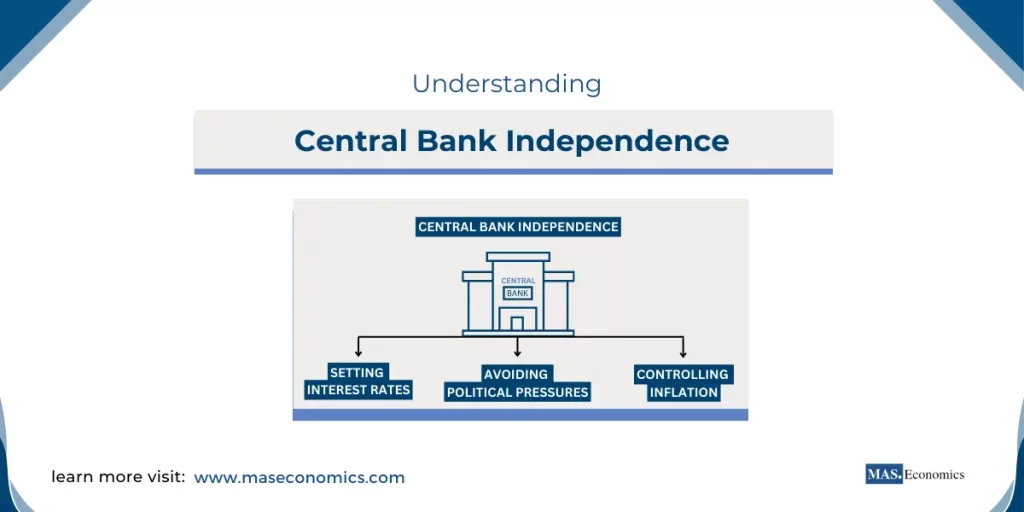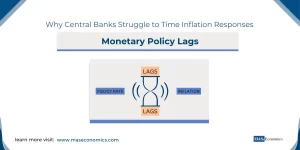Central bank independence (CBI) is often discussed in economics, but what does it mean? More importantly, why is it crucial for economic stability? Central banks manage monetary policy, control inflation, and stabilize the financial system. However, the level of their independence has sparked debate, especially regarding its compatibility with democratic governance.
The concept of central bank independence, its evolution, and its role in preventing political interference in monetary policy are key topics of interest, alongside the ongoing debates about whether central banks have become too independent, particularly after economic crises.
What is Central Bank Independence?
Central bank independence refers to the degree to which a central bank is free from direct political or governmental influence in setting its policies and achieving its objectives. This independence is crucial for maintaining a stable economic environment, as it allows central banks to focus on long-term economic health rather than short-term political interests.
In practical terms, central bank independence means:
- Setting Interest Rates: The central bank can determine interest rates without government interference.
- Controlling Inflation: The central bank has the autonomy to use tools like open market operations and reserve requirements to control inflation.
- Avoiding Political Pressures: The central bank operates independently of electoral cycles and government mandates, which helps prevent the adoption of short-sighted monetary policies driven by political motivations.
The primary aim of central bank independence is to ensure that monetary policy decisions are based on economic considerations, not political pressures. This independence is intended to create an environment conducive to price stability and overall economic growth.
The Evolution of Central Bank Independence
Historical Context
The concept of central bank independence gained traction in the latter part of the 20th century, particularly during the 1990s, as countries experienced recurring cycles of inflation and economic instability. The key idea was that central banks needed to be shielded from political influence to make sound economic decisions, especially in managing inflation.
One notable example is the Bundesbank of Germany, which has been highly independent since its inception and has been credited with maintaining low inflation rates for decades. The success of the Bundesbank served as a model for other central banks worldwide, inspiring a trend towards greater independence.
Independence After the Great Recession
The Great Recession of 2008 highlighted the complex balance that central banks must strike between independence and governmental cooperation. As governments struggled to deal with fiscal deficits and economic contractions, central banks were often called upon to support expansive fiscal policies. This raised questions about the boundaries of their autonomy and whether their independence had eroded in practice.
In some countries, central banks were pressured to take extraordinary measures such as quantitative easing to stabilize financial systems. This blurred the lines between fiscal and monetary policy, leading to renewed debate on the appropriate level of independence.
The Importance of Central Bank Independence
Shielding Monetary Policy from Political Pressures
One of the most important benefits of central bank independence is that it shields monetary policy from political pressures. Governments, which are influenced by election cycles, might favor policies that boost short-term economic growth, even if these policies could lead to long-term economic instability. For instance, keeping interest rates artificially low to stimulate the economy might result in higher inflation later on.
Independent central banks are able to focus on long-term economic objectives, such as price stability and sustainable growth, rather than succumbing to short-term political motives. This ensures that monetary policy decisions are made in the best interest of the economy as a whole.
Managing Inflation
Maintaining low and stable inflation is one of the key mandates of central banks. When central banks are subject to government interference, there is a risk that inflation targets will be compromised for political reasons. Hyperinflation in Argentina during the 20th century serves as a cautionary tale—repeated political interference led to uncontrolled inflation, severely undermining economic stability.
Research has shown that countries with independent central banks tend to have lower and more stable inflation rates compared to those where central banks are under direct government control. This is because independent central banks can make unpopular but necessary decisions, such as raising interest rates, without fear of political backlash.
Ensuring Financial Stability
Central banks also play a crucial role in maintaining financial stability, especially during periods of economic uncertainty. For example, the Federal Reserve in the United States acted independently during the 2008 financial crisis, making tough decisions to inject liquidity into the financial system. These measures, although controversial, were critical to preventing a complete collapse of the financial sector.
By acting as a lender of last resort without political interference, central banks can provide stability in times of crisis, helping to maintain confidence in the banking system.
The Debate: Are Central Banks Too Independent?
Concerns About the Democratic Deficit
One of the key criticisms of central bank independence is the so-called democratic deficit. Critics argue that central bank decisions—particularly those related to interest rates and monetary policy—can have significant economic and social impacts, yet central banks are often run by unelected officials who are not directly accountable to the public.
For instance, during the Trump administration, the U.S. Federal Reserve faced public criticism from the President, who accused the institution of not doing enough to stimulate the economy. Such instances highlight the tension between maintaining an independent central bank and ensuring that these powerful institutions remain accountable to the public.
Some political scientists argue that allowing unelected technocrats to control key aspects of economic policy reduces democratic oversight and undermines the role of elected governments. This critique is particularly relevant in democracies where accountability and representation are core values.
Accountability and Transparency as Solutions
To address these concerns, proponents of central bank independence emphasize the importance of accountability and transparency. Central banks must be transparent in their decision-making processes to justify their actions to both the government and the public. Measures like publishing meeting minutes, holding press conferences, and issuing policy reports are all ways in which central banks can enhance their transparency.
The European Central Bank (ECB), for instance, has made efforts to increase its transparency by publishing detailed reports and communicating its monetary policy decisions more openly. Such measures help bridge the gap between independence and democratic accountability, ensuring that central banks maintain public trust while retaining the ability to make economically sound decisions.
Case Studies of Central Bank Independence in Practice
Argentina
Argentina’s central bank provides a stark example of the consequences of compromised independence. During times of fiscal crises, such as in the early 2010s, the central bank was pressured by the government to sell foreign reserves to cover debts. When the central bank governor refused, he was subsequently removed from office. This incident highlighted how political interference can undermine a central bank’s ability to maintain economic stability.
Argentina’s lack of central bank independence has contributed to its prolonged struggles with inflation, which has been difficult to control due to frequent political meddling in monetary policy.
Turkey
Another example is Turkey, where the government has repeatedly intervened in central bank decisions. In recent years, the President of Turkey replaced several central bank governors for not lowering interest rates in accordance with his wishes, despite rising inflation. These actions have eroded investor confidence in Turkey’s economy and led to the depreciation of the Turkish lira, illustrating the economic cost of political interference.
The United States
In the United States, the Federal Reserve has historically managed to maintain a degree of independence, despite occasional pressure from political leaders. During the Trump presidency, there were numerous instances of public criticism of the Fed’s policies, including interest rate decisions. However, the Federal Reserve continued to make decisions based on economic data rather than political directives, underscoring the importance of central bank independence for economic stability.
Balancing Independence and Accountability
The Role of Legal Frameworks
The extent of a central bank’s independence is often determined by its legal framework. Central banks need instrument independence—the ability to decide how to achieve their objectives—but they do not have goal independence—the authority to set those objectives independently of the government. The government usually defines the goals, such as price stability or employment targets, while the central bank decides how to achieve them.
The legal foundation of central banks is crucial in determining their ability to remain independent. Some central banks, like the ECB, have strong legal protections that make it difficult for governments to interfere with their operations.
Accountability Through Reporting
Accountability mechanisms are essential for ensuring that central banks do not overstep their boundaries. Central banks are typically required to report to the legislature or finance ministry, and their actions are scrutinized by the public through regular reports and parliamentary hearings. This ensures that while central banks are independent, they remain answerable for their actions.
For instance, in many countries, central banks are required to present reports on their monetary policy activities to parliament, allowing elected representatives to ask questions and scrutinize their decisions.
Conclusion
Central bank independence is crucial for modern monetary policy, enabling these institutions to make difficult decisions for long-term economic stability. While insulating monetary policy from political pressures is essential, transparency and accountability are equally important to maintain public trust.
The debate over whether central banks are ‘too independent’ underscores the need to balance effective economic policy with democratic accountability. In a time of frequent economic crises and growing political pressures, central banks must carefully navigate this balance to promote stability, growth, and public welfare.
FAQs:
What is central bank independence?
Central bank independence refers to a central bank’s ability to set monetary policy without direct political influence. This independence allows central banks to focus on long-term economic stability rather than short-term political interests.
Why is central bank independence important?
Independence is crucial because it enables central banks to make decisions aimed at maintaining low inflation, supporting sustainable economic growth, and ensuring financial stability without political pressures that may favor short-term economic boosts.
How do central banks avoid political pressures?
Central banks avoid political pressures by setting interest rates, controlling inflation, and managing monetary policy independently of government directives. This means that their actions are based on economic data rather than political agendas.
What is the “democratic deficit” in the context of central bank independence?
The “democratic deficit” refers to the concern that unelected central bank officials make decisions with significant economic impact without direct accountability to the public, potentially undermining democratic oversight.
How do central banks maintain accountability while remaining independent?
Central banks enhance accountability through transparency measures, like publishing policy reports, meeting minutes, and holding press conferences, which help keep the public and government informed about their decisions.
Can central banks be too independent?
Some critics argue that excessive independence can reduce democratic oversight, as central banks wield significant economic power. Legal frameworks and accountability mechanisms are essential to balance independence with public accountability.
What happens when central banks lack independence?
When central banks lack independence, they may face political pressure to make decisions that prioritize short-term gains over long-term stability. Examples include Argentina and Turkey, where political interference in monetary policy has led to high inflation and economic instability.
How do legal frameworks support central bank independence?
Strong legal frameworks define central banks’ objectives and protect their decision-making processes from political interference. This allows central banks to implement policy based on economic conditions rather than political demands.
Thanks for reading! Share this with friends and spread the knowledge if you found it helpful.
Happy learning with MASEconomics




